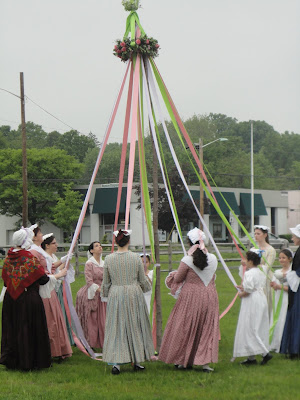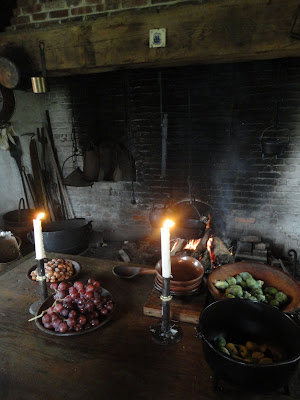
History comes alive at the Bergen County Historical Society's events, as it did at their Pinkster Fest, a colonial celebration of Spring, in River Edge, New Jersey. Dancing around the May Pole took place near a batting cage center and a BP Gas station on a very busy road leading to a mall, a Target and a major highway. History seemed to rubbing up against the present, flirting with modern day inhabitants to come back.
The spring and the return soon of summer is worth breaking out into dance for, wouldn't you agree?

From the BCHS web site:
"Pinkster is the Dutch name for Whitsunday or Pentecost, when a flower-crowned May Queen and King led merry-makers from door-to-door, gathering dyed eggs, butter, bread, cream, coffee, sugar, and tallow candles in baskets for a festive supper and dance. Toasts with buttermilk, known as "white wine," and recital of the Pinkster Ode welcomed the return of summer."

The bust of Oratam is tucked away in another part of the house. Remembering, always, whose traditions were gone. He became chief of the Hackensacks after the Dutch eliminated the leadership of his community in 1643 in the brutal massacre of Pavonia, and lived to be nearly 90 years of age, according to a BCHS plaque.

Admiring the baskets, some made using Native American techniques, historian Kevin Wright reminded me in our age of plastics and cardboard, we forget how baskets were used to hold all manners of things, from eggs, to fruits to even pigeons. It saddens me when I see them discarded in the trash so easily, and have a newfound appreciation for them.

When I look at the bed at one of their historic homes (with roping on the frame and a mattress filled with hay), I long for a more uncluttered existence. Clutter so fills my life, as it does many other's. Think of the amount of time we spent acquiring, organizing and later disposing of our clutter.

Who needs gadgets to entertain? It was nice to see so many children at the event, who seemed to enjoy games their colonial counterparts would have played.

This barn has always intrigued me, and Kevin told me it was reconstructed from a brewery in 1889.

Did you know Bergen County was a strawberry capital? Schools were closed the first two weeks of June for pickings and festivals. Kevin said the earliest reference to strawberries was a girl killed by a snake picking them in 1693 in Bergenfield.
These baskets would be ones sent to the markets of New York City, and contained markings on the bottom so they could return to their rightful owner during transport back.

Reading material in the outhouse. Learn more about the fascinating history of the Sears Roebuck catalog. American consumerism would soon be well on its way.

Whole foods adorn the table in the Dutch out kitchen: hazelnuts, grapes, Brussels sprouts. Not any list of ingredients you cannot pronounce or spell like today.

Shall we have some lemonade in the tavern?

The end of winter for most of us in modern life often means a more comfortable commute to work, less bulky clothing and more activity outdoors, it was in earlier times a true cause to celebrate. One really did endure cabin fever. Fields were now to bear their harvest once more, providing the fruits of life we take for granted. Think high food prices are an inconvenience now? Imagine if you had to grow and harvest your food yourself, and the elements impacting your survival. While I worried about would I have to wear my clunky rainboots another day, Mary, a farmer at Abram Demaree Homestead where I picked up pea soup, strawberry jam and other goodies, had a more pressing complaint: the last days of rain mean she couldn't plant in her very muddy fields.
I celebrate the return of spring and summer, and the bounty that will soon be on our tables thanks to our farmers. I give thanks to the Bergen County Historical Society, for another merry and informative event.
I'm reading "Made from Scratch: Reclaiming the Pleasures of the American Hearth" by Jean Zimmerman now. I kept thinking of you this morning on the train as I was reading about How Things Once Were and how places that you so often showcase here help to tie us to a quickly vanishing way of being. (I'll let you know how the book is overall. So far, I love it!)
ReplyDeleteAnyhoo, I thought it was hilarious when she noted that although we crave this historic, more home-centered way of being, we're also not too inclined to fully embrace it. People were horrified to come upon a pig being slaughtered behind one of the houses in historical Williamsburg (parents complained that the sight had "damaged" their children. I wanted to say--how is seeing the truth of a thing damaging? How do you think that ham gets there?!) and certainly wouldn't want to embrace the cleaning of chamber pots! So many things are so much easier today, yet I think we are losing vital parts of our collective self. I love that these places and celebrations continue.
You make New Jersey look swell!
ReplyDeletemaybe I should move..?
That sounds like a great read!
ReplyDeleteImagine how damaged their children would be to walk through a factory farm and see pregnant pigs in stalls that can't even turn around so they can have cheap bacon. I am so sad we live in a society that embraces ignorance and that so clearly values objects over life.
New Jersey is quite lovely, the taxes and cost of living, stifling. Feel like moving is inevitable, but to where?
The Pinkster Fest looks great, thanks for sharing the photos and descriptions here. Where I grew up we did also go wild-strawberry picking in the fields, and blueberry picking in the mountains to be able to put up jam and jelly each summer for the next winter. It is hard work that's wonderfully fun. Welcome summer!
ReplyDeleteHi Jennifer. My pleasure, and thanks for the comment. I was so thrilled to see the first New Jersey strawberries at a farm recently, and inhaled their perfume which is as fine as any concoction from the store. Avis DeVoto writes in a letter to Julia Child that a strawberry that's traveled such far distances doesn't compare in taste to one that's in season locally. The simple pleasures really do transcend time.
ReplyDeleteWelcome summer indeed.